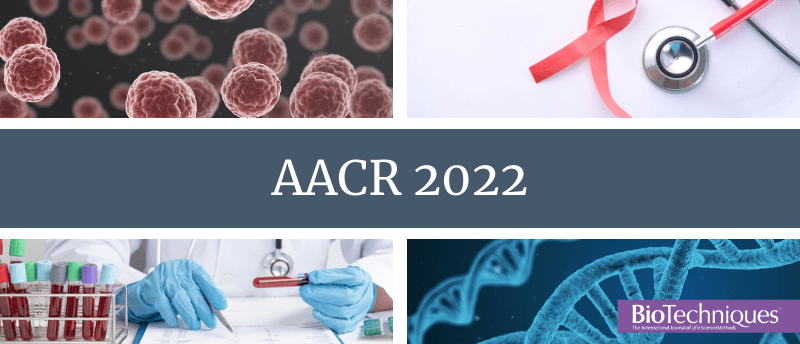How to make the most of your time at AACR

What is AACR 2022?
AACR is an annual meeting hosted by the American Association for Cancer Research. The meeting brings together people working across the field of cancer research to share the latest discoveries and advances in cancer science and medicine. This year the conference is focused on decoding cancer complexity, integrating science and transforming patient outcomes.
At BioTechniques, we are thrilled to attend following a two-year hiatus due to the pandemic. Whether you’re an old hat or it’s your first meeting in person, we’d like to offer some advice on making the most of your time in New Orleans.
Top sessions to look out for:
Single Cell Biology in Scale and Spatial Genomics
(April 9, 10:00 am – 11:30 am)
This session will give insights into new approaches to single-cell sequencing, computational methods and the use of spatial information that enables further dissection and characterization of tumors. The session will review recent technological developments in single-cell biology and spatial genomics and focus on methods that allow the highly scalable characterization of tumors.
Multiomics Approaches for Novel Oncopathogen Discovery and Related Mechanisms
(April 12, 10:15 am – 11:45 am)
New “omic” technologies might have clinical results due to discoveries of new disease subgroups and novel oncopathogens. In this session, you will hear about recent advances in the characterization of pathogen-associated cancers using next-generation sequencing technologies and how this may translate into novel therapeutic opportunities.
Epigenetics in Cancer
(April 8, 3:00 pm – 4:30 pm)
Alterations in the epigenome are at the core of intractable malignancies. This session will focus on the general principles through which epigenetic alterations lead to malignant cancer cells. Using some examples, the session will then look at how insights from epigenetic studies point towards novel precision therapeutic approaches.
Deep Learning for Cancer Imaging
(April 11, 12:30 pm – 2:00 pm)
This session will focus on how machine learning and deep learning can be used to understand normal and disease cell sites in images used for cancer research and diagnosis. The session will highlight the cutting-edge tools available alongside recognizing challenges associated with the interpretation of biomedical datasets.
Models for Rare Cancers
(April 12, 10:15 am – 11:45 am)
Using patient-derived models gives rise to personalized medicine opportunities for rare cancers and fuels preclinical research and drug discovery. This session will use patient-derived models such as organoids and xenografts for precision medicine using high-throughput drug screening and in vivo validation to lead to promising new treatment options.
The most comprehensive view of the cancer genome with Oxford Nanopore
(April 10, 1:30 pm – 2:30 pm)
Join a spotlight theatre presentation with Oxford Nanopore, where researchers will share how nanopore sequencing has opened a new window of understanding into the cancer genome. They’ll cover new methods of interrogating hereditary cancer predisposition to rapid insights into pediatric leukemias.
Top tips for AACR first timers, provided by Sartorius:
Prepare in advance.
Practice your talk, review your poster presentation, or if you are there as an attendee, review the agenda. This allows you to focus on your field of research or branch out to other related scientific interests.
Conferences mean long days that are both physically and mentally taxing. Make sure you bring snacks to fuel yourself and shoes that are comfortable!
Network, network, network!
Conferences are an opportune time to meet key leaders in your field of interest. This can be accomplished by walking the floor, attending talks or even more importantly in the more relaxed environment of social events. Take the opportunity to speak to the person next to you during a coffee break, as you never know, that person may be pivotal in assisting you in your next big research breakthrough.
Engage.
Talk to your current network about their recommendations as far as interesting talks or posters. Don’t be afraid to ask questions to presenters – you will be surprised with how your conversations will lead to new questions and take-aways that may not have been summarized within their presentation.
Take the time to speak with the vendors as it allows you to gain insight into the most recent advances in instrumentation and reagents. There is no better opportunity to talk to the people who are introducing innovative products for your current or future needs than at these conferences.
You can find representatives from Sartorius at booth #1757 where they will be displaying a Live-Cell Analysis System and a Protein Analysis System and experts will be there to discuss their Advanced Flow Cytometry Platform. Look out for their poster presentations with Tim Jackson titled “Label-free, real-time live-cell assays for 3D organoids embedded in Matrigel®” and with John Rauch titled “Dynamic live-cell visualization and quantification of Akt activity using a genetically-encoded, fluorescent kinase translocation reporter”.
Where to find BioTechniques?
You can find us at booth 3025 in the exhibition hall. Come and say hi to discuss any research you may want to submit, how you could work with us to share more news from your lab or just to chat!
Keen to get ahead of the game?
Get some pre meeting preparation done with Oxford Nanopore’s Cancer Research Symposium
(April 6, 2:00 pm BST)
Get prepared for AACR with Oxford Nanopores Cancer Research Symposium. Nanopore sequencing delivers comprehensive insights into the cancer genome, with the ability to characterize SNVs, structural variants and base modifications. Experts across the field of cancer genomics will showcase innovative uses of nanopore technology in the cancer research space.